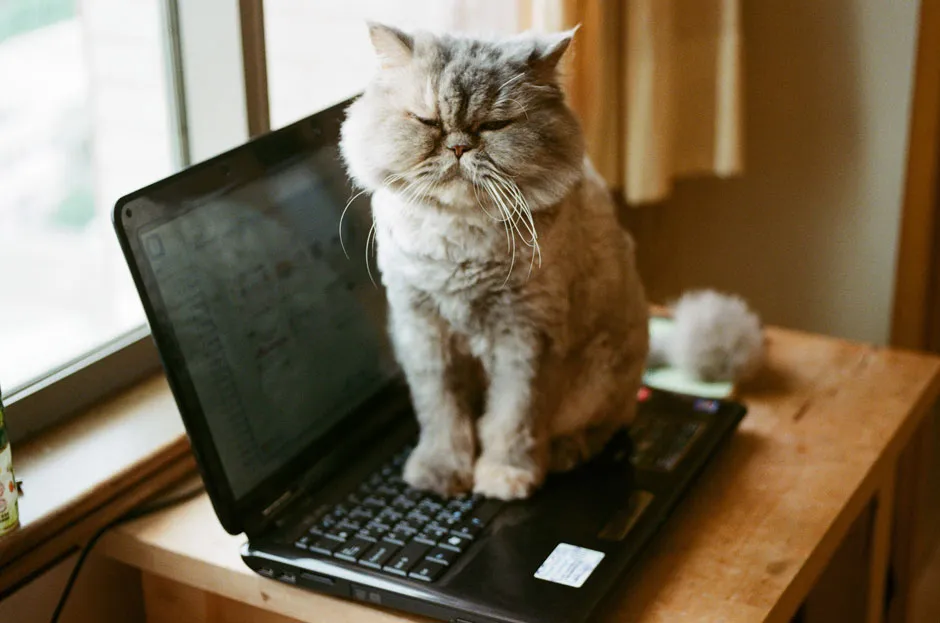Owner of an adorable and cherished cat? Then chances are they’re ruining everything again by blocking your view of this page – especially if you’re reading from your laptop.
But what’s the reason behind this behaviour? Why are cats obsessed with our computers?
Unfortunately, no large-scale (and probably very impractical) scientific experiment has yet delved into this question. However, feline behavioural experts still have a key theory to explain your keyboard cat.
Why does my cat sit on my laptop?
Unfortunately, it’s probably not a form of copycat behaviour – your moggie doesn’t see you typing and want to join in on the fun.
True, recent research suggests that felines are able to imitate human behaviour. (One study even demonstrated cats can map their body onto ours in order to repeat actions, such as touching a box with their head or specific limb).
However, according to Dr David Sands – expert in animal psychology with over 25 years of clinical experience –the action of typing isn’t easily mimicked by cats. This explains why they likely won’t be interested in any decoy old laptop you try to entice them with.
Read more about cats:
- Why do cats knead?
- Why do cats purr?
- Why you’re stroking your cat completely wrong (and how to do it right)
It’s also unlikely cats are solely drawn to the warmth your laptop generates, either. “Yes, laptops emit heat and hot spaces are attractive to cats. But you need to ask why your cat doesn’t just sit by a radiator, for instance,” says Sands.
The real attraction of your laptop to cats? Its scent. Or, to be more precise: the scent you regularly deposit there.
“You won’t be able to sniff it, but a cat can smell you all over the keyboard,” says Sands.
“Cats are scent machines from the end of the tail to the tip of their nose. Their world is about scent – their eyesight's developed for night-time hunting, meaning their sense of smell is really important at other times.”
However, while it’s possible your cat may sit on your computer as they enjoy this scent, another explanation is far more likely, according to Sands.
“It’s more probable your cat wants to deposit its own scent and supplant yours. It’s all about ownership – by doing this your cat is effectively saying ‘I own you!’
“People always think cats rubbing themselves against you or things you touch are expressing love. But actually, cats are very possessing individuals. For them, the more they can brush past you and deposit your scent, the better!”

Just in case you have any doubt your cat is hell-bent on becoming the dominant force in your house, Sands adds: “While dogs have been bred to become our companions, cats are still reasonably feral. They have been largely bred as vermin control and are not social creatures – they’re out for themselves.
“Remember: cats are evil geniuses – they’re in that swivelling chair in the James Bond films for a reason.”
Is it unhealthy for my cat to sit on my laptop?
From closing important documents without saving, to sending another message to your boss along the lines of ‘s,ll,;;;;;l;mk’, a laptop-lounging cat can cause you plenty of emotional damage. And if they are disrupting your work, Sands advises cleaning your laptop regularly.
However, your cat is unlikely to be harmed by chilling on your computer. “Physically, this won’t hurt then. And cognitively, you only really need to worry about this behaviour if it occurs with others,” he says.
“If your cat is also vocalising a great deal and constantly following you around the home, it could be a sign of anxiety and attention-seeking.”
But if your cat isn’t showing these signs? There’s no reason why they can’t sprawl across your keyboard. Well, they do own it, you and everything else in the home.
About our expert, Dr David Sands
With a doctorate in ethology (animal psychology) at Liverpool University, Sands has over 25 experience at his animal behavioural clinic. He is a Fellow of the Canine and Feline Behaviour Association (CFBA) and the Association for the Study of Animal Behaviour (ASAB). Sands is also the author of Cats 500 Questions Answered, Hamlyn, £4).
Read more about the science of cats